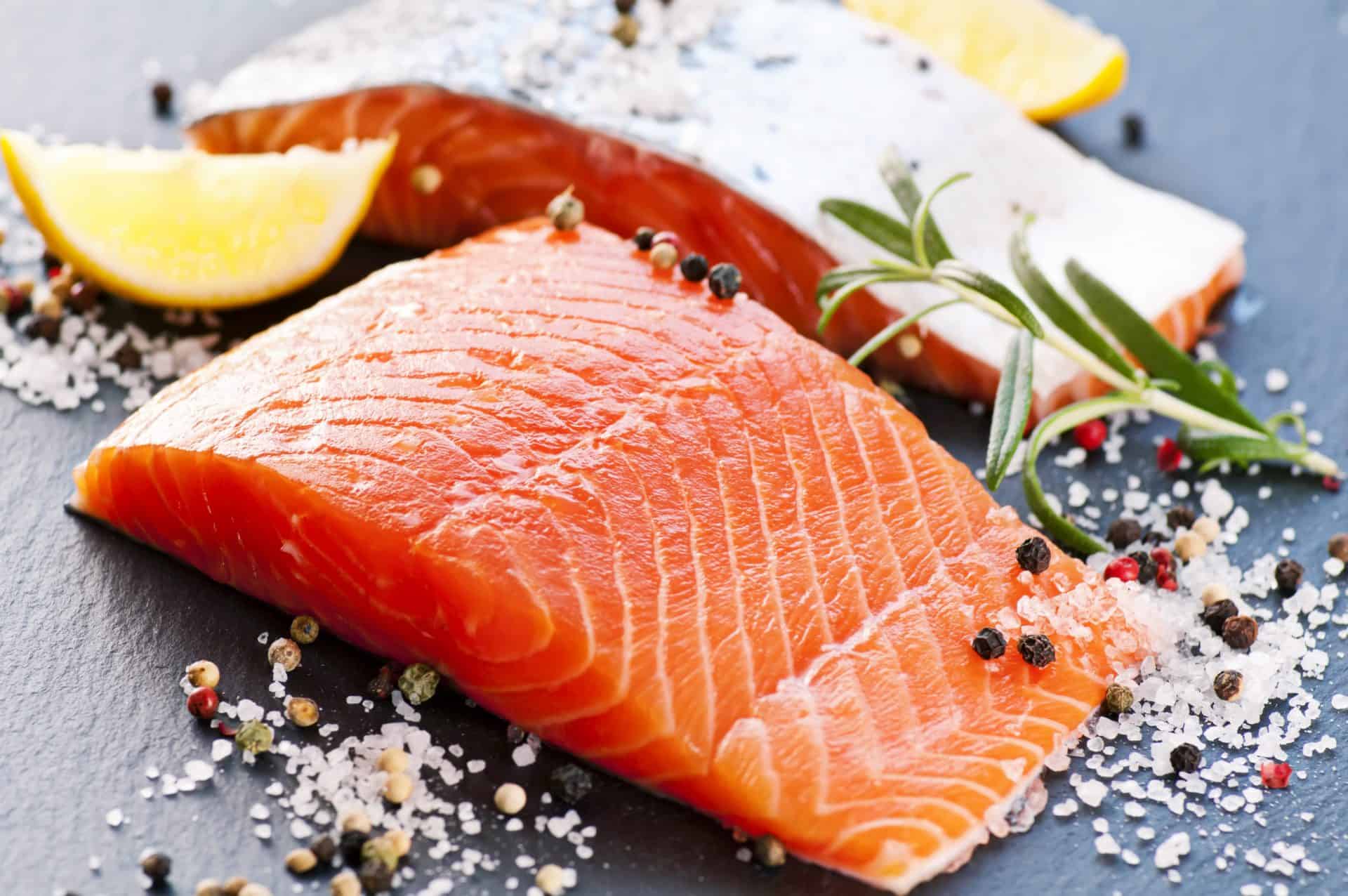Recent Posts
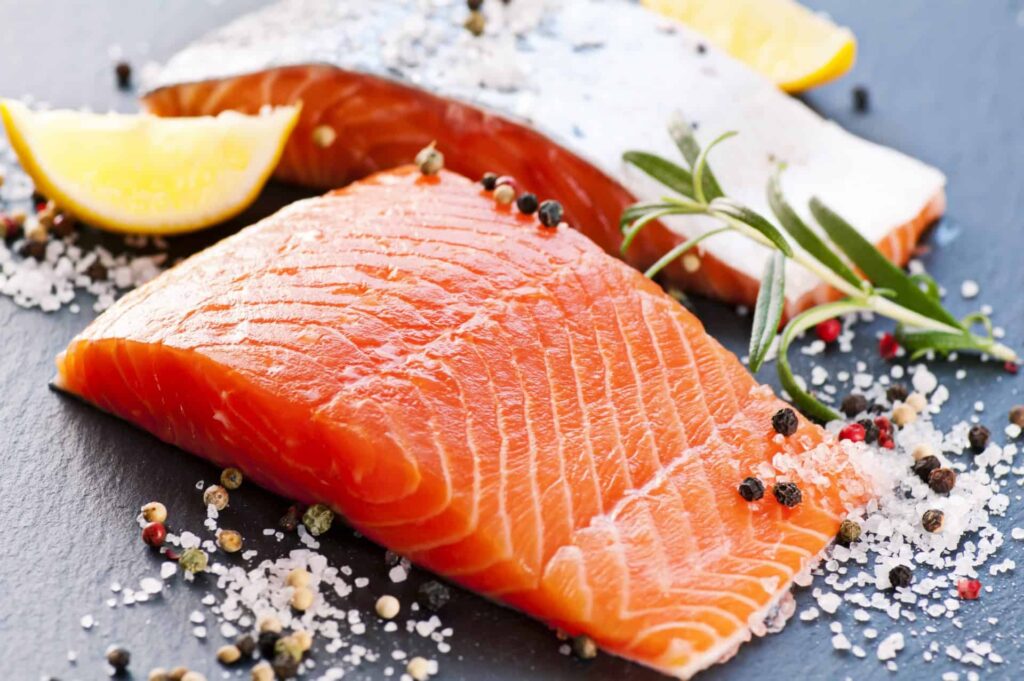
WHAT ARE OMEGA 3 FATTY ACIDS?
Omega 3 fatty acids are a form of polyunsaturated fats. There are three types of Omega 3s involved in human physiology. These are:
- Alpha-linolenic acid (ALA, not to be confused with Alpha Lipoic Acid)
- Eicosapentaenoic acid (EPA) and
- Docosahexaenoic acid (DHA).
Both DHA and EPA are important for human health. DHA is the primary component of brain, skin and retina cells and EPA is a powerful anti-inflammatory.
ALA is the precursor molecule found in many plants foods, such as kale, collard greens, winter squash, flaxseeds, walnuts and chia seeds. Plant sources are however less bioavailable. The ALA needs to be converted to EPA and DHA in the human body. However, our bodies are not efficient at converting ALA into DHA and EPA and so the conversion rate is often below 20%. ALA therefore, is not a reliable way to ensure that you get sufficient amounts of DHA and EPA. This also means that if you take a lot of ALA either from a supplement or from plant foods such as flaxseeds, chia seeds, soy and walnuts you can end up with a lot of Omega 3 fatty acids that are not particularly useful to the body. As all polyunsaturated fats are delicate and oxidise very easily with exposure to oxygen, this may not be useful for health. Omega 3s can be found in animal sources, including in grass fed beef, grass fed butter and Omega 3 enriched free-range eggs, however, one of the most bio available sources of Omega 3 fatty acids is found in cold water oily fish. Fish offer so many benefits to human health. Eating fish provides a great source of protein. Protein is an important building block of bones, muscles and blood and the body uses protein to build and repair tissue. Fish is also one of the few dietary sources of Vitamin D. Vitamin D is an essential micronutrient which helps to regulate calcium and phosphate levels in the body and is also important for immune health. The body manufactures Vitamin D from sun exposure but for those living in Northern Hemispheres, in particular, additional dietary sources or supplements containing Vitamin D are important. A study in 2011 estimated that 41.6% of the US population is deficient in Vitamin D. Fish and fish oil is also an excellent source of the long chain Omega 3 fatty acids that are essential to our health.
THE BENEFITS OF OMEGA 3s
Numerous scientific studies have shown that Omega 3s are beneficial to human health in so many different ways and are anti-inflammatory. Our ancestors are thought to have consumed a diet with roughly equal amounts of Omega 3s and Omega 6s. Now, it is estimated that the average American eats upwards of 20 times the more pro-inflammatory Omega 6s than the anti-inflammatory Omega 3s. The benefits of Omega 3s include decreased risk of heart disease and cancer, lowering of triglycerides, improvements in joint mobility, decreased insulin resistance and improved brain function and mood. Let’s delve into a few of these to understand how consuming Omega 3s, in particular, oily fish can really help to keep you healthy.
CARDIOVASCULAR HEALTH
A number of studies have confirmed that regular consumption of fish and Omega 3 fatty acids is associated with a decreased risk of mortality from heart disease, including among patients who have already suffered an episode of heart failure. Adequate Omega 3 consumption has been shown to improve blood circulation, support healthy cholesterol and triglyceride levels, help to reduce the risk of blood clots that cause heart attacks and reduce the risk of high blood pressure. Those people on blood thinning agents including aspirin should consult their medical physician before taking Omega 3 supplementation.
BRAIN HEALTH, KEEPING YOU SMART……
Omega 3 fatty acids have been associated with reduced cognitive decline as you age. In a study of over 6000 men and women over the age of 65 for a period of 5 years, scientists found that individuals who included fish in their diet at least once a week had a 10% slower decline in cognitive function that those who consumed fish less than once weekly. Individuals who consumed fish twice or more times per week showed a 13% slower decline in cognitive function. Another study tracked fish consumption and memory function on 260 cognitively-normal individuals over a period of 10 years. During this period, scientists measured the individuals’ brain volume by (MRI) brain scans. They discovered that eating fish once a week increased brain volume in grey matter in four key areas that control memory and higher cognitive function such as decision-making and consciousness: the hippocampus, the orbital frontal cortex, the precuneus and the posterior cingulate.
DEPRESSION
Fish has also been linked to improved mental health, specifically reducing the symptoms of depression. In a meta – analysis published in the Journal of Clinical Psychiatry, the results of 10 clinical trials of studies where individuals with depression were prescribed Omega 3 fatty acid supplements, indicated a significant anti-depressant effect of Omega 3 among patients who had clearly defined depression. Similar results were also found with individuals suffering from bipolar disorder.
CHILDHOOD DEVELOPMENT
EPA is important for neuronal transmission (communication between neurons). DHA is a major structural component of neuronal membranes. The fatty acid composition of brain phospholipids is critical to neuro development and physiology. Dietary intake of Omega 3s has been shown to affect brain function, memory and cognition in children. In particular, DHA levels have been linked to IQ. DHA represents about 15% of all fatty acids in the frontal cortex. The frontal lobe is responsible for executive functioning and higher order cognitive activities such as planning, problem solving and focused attention. Based on scientific evidence, children may benefit from a minimum intake of DHA of between 125mg and 250mg per day. This can be met by eating oily fish 3 times per week or by taking a purified fish oil supplement containing both EPA and DHA. It is thought that children with learning or attention problems or mood issues might benefit from additional intakes of EPA and DHA.
HOW THE BRAIN WORKS
To understand how Omega 3 fatty acids can enhance brain function it is important to first understand a little bit about how the brain works. The brain contains billions of brain cells called neurons which can connect together to form a huge a network, allowing the neurons to send and receive information to and from each other. Neurons store neurotransmitters in vesicles in their cells until they are ready to release a signal. When a neuron releases neurotransmitters, the cell membrane receptors on another neuron allow it to receive this information. Neurotransmitter receptors are made from the proteins (derived from our food) and are a component of the cell’s membrane. The membranes also contain fats and phospholipids which make the membranes fluid. This is important as the more fluid a cell membrane is, the more flexible it is at allowing substances in and out of the cell. Membrane fluidity protects the integrity of a cell and ensures that the cell gets enough nutrients to give it energy and to allow the cell to grow and adapt to changes in environment.
DHA
DHA is one of the fats contained in a cell membrane that are so vital in keeping its structure and function. The fluidity of a cell membrane is determined by the amount of DHA within the membrane. DHA is flexible – it can twist and change shape and can alter the properties of the cell membrane. DHA plays a very important role in:
- Improving signalling between neurons
- Protecting the brain from oxidative stress
- Promoting the release of neurotransmitters and
- Preserving the integrity of the cells.
Protecting the integrity of brain cells is very important as brain cells don’t regenerate easily. The fats in an individual’s brain increase rapidly until the age of 20, gradually decrease until the age of 80 and rapidly decrease after this. With this process of neurodegeneration, you begin to make less neurotransmitters and produce more reactive oxygen species (“ROS”) and synaptic plasticity is reduced. A person becomes less able to form new memories and old ones are lost. Brain function declines and you begin to lose intelligence.
OXIDATIVE STRESS AND THE IMPORTANCE OF HEALTHY FATS
Oxidative stress is essentially an imbalance between the production of free radicals and the ability of the body to counteract or detoxify their harmful effects through neutralisation by antioxidants. Oxidative stress can be caused not just by environmental pollutants, such as tobacco smoke, pesticides, car fumes, drugs etc. but also by the body’s internal processes. Cell metabolism is a chemical process carried out by cells to make, use and store energy to keep you alive. This life sustaining process requires oxygen. Whenever the body uses oxygen, it generates molecules called reactive oxygen species (ROS). The human body usually gets rid of ROS by making antioxidants such as glutathione. However when there are too many ROS, they can damage cells causing oxidative stress. The body can make its own antioxidants, but you can also obtain them from your diet by eating a wide range of antioxidant rich foods including plentiful vegetables and fruit. Antioxidants work in 3 key ways to:
- Stop existing ROS from causing damage to cells
- Prevent excess ROS formation and
- Repair damage that has already been caused by ROS.
This is extremely important because if the fats in your cell membranes are destroyed by ROS, those cells won’t be able to send and receive information effectively which can impact your intellectual performance. In addition to consuming plenty of antioxidant rich foods in your diet, it is also fundamentally important to consume adequate intake of healthy fats.
WHERE CAN YOU FIND DIETARY SOURCES OF OMEGA 3S?
As already mentioned, you can find plant sources of Omega 3s in the form of Alpha Linolenic Acid, in flaxseeds, chia seeds, kale, collard greens, walnuts and winter squash. However, due to the low conversion rate of ALA into DHA and EPA, unless you are vegetarian or vegan, more readily available sources of Omega 3 fatty acids include salmon, sardines, anchovies, grass-fed beef, halibut, shrimp and tuna. These sources of Omega 3s are also rich sources of protein which is important. The neurotransmitters used for signalling in the brain are amino acids (the building blocks of protein) or derivatives of amino acids. In order for the nervous system to synthesize and circulate neurotransmitters, you need to have consume adequate levels of B Vitamins, in particular B6, B12 and folate. These B Vitamins can be found in abundance in foods such as bell peppers, spinach, calf’s liver, spinach, broccoli, parsley, beetroot, asparagus, romaine lettuce and lentils.
WHAT ABOUT THE TOXINS?
The benefits of eating fish are substantial, but you need to choose wisely to limit the ingestion of environmental contaminants. Environmental toxins such as heavy metals, including mercury, polychlorinated biphenyls (PCBs), dioxins and other toxins can be found in fish, particularly in larger fish which are further up the marine food chain. Mercury is a neurotoxin that is especially detrimental for brain development in utero and throughout early childhood. It has been argued that fish contain such high levels of selenium (a powerful antioxidant) to negate concerns about mercury toxicity. However, large fish such as swordfish, marlin and shark should be avoided especially for pregnant women and children. As with animals and humans, fish store these toxins in adipose tissue (body fat) and therefore cooking fish without the skin on and removing the fatty layer close to the skin can help to reduce toxin consumption. Preparing and cooking fish in this way has been estimated to reduce exposure to PCBs and other contaminants by as much as 50%. Unfortunately, this won’t negate the mercury levels, although it has been argued that fish contain such high levels of selenium (a powerful antioxidant) that this also limits concerns about mercury toxicity. When cooking fish, you should also avoid high heat or deep frying as this can damage the polyunsaturated fats within the fish, including the Omega 3s. Sadly battered fish and chips from your local fish and chip shop might be a nice treat, but it is unlikely to boost your Omega 3s. This may even have the opposite effect as you are likely consuming oxidised fats.
FARMED FISH V WILD FISH
You’ve probably heard that it’s better to eat wild sea fish such as wild salmon, but why is this? Some farmed fish are raised under unsanitary conditions and are exposed to high levels of dangerous chemicals, including dioxins, dieldrin, toxaphene and other pesticides. These toxins can be present in the feed that the fish are fed and easily become absorbed into the fish’s fat cells. Salmon are often fed artificial dyes to help their flesh match the colour of wild salmon (obtained from their wild diet of crustaceans, such as shrimp). Farmed fish such as salmon can also be kept in cramped waters with little room for the exercise enjoyed by their wild counterparts. As a result farmed fish are generally fattier. This can result in exposure to their own waste and problems such as sea lice. The waste from a large salmon farm has been compared to the sewage from a city of 10,000 people! These result in the need for antibiotics thereby increasing the exposure of the fish to artificial substances. Wild salmon contains between 19-27% of its total fat in Omega 3s. Generally speaking, farmed fish can contain lower amounts of Omega 3s, higher levels of Omega 6s and saturated fats and less protein. However, farmers are starting to realise that the fatty acid composition of the feed can affect the types and levels of Omega 3s contained in farmed fish. Fish which are fed on algae may contain more short-chain Omega 3s while carnivorous fish are rich in long chain Omega 3 fatty acids. This is important as it is the longer chain DHAs and EPAs that are readily available for human health. Current food labelling regulations also do not require food products to distinguish between the types of Omega 3s so the “Omega 3 rich salmon” you buy in your local supermarket may in fact be rich in the short chain ALAs which are not readily converted by the body into EPAs and DHAs. There are also sustainability issues associated with eating fish. It is estimated that over 41% of European wild fish stocks are currently being overfished causing biological depletion. 40% of freshwater fish are threatened with extinction. It is estimated that between 310 and 700 billion wild fish globally (an average of 18.9 million tonnes) are exploited to make fish oil and fishmeal each year. The production of other captive fish and shellfish (which are fed a more vegetarian diet) helps to offset this.
OMEGA 3 SUPPLEMENTATION
Generally speaking, we should try to obtain our Omega 3 fatty acids from dietary sources. However, if you struggle to eat 2-3 portions of fish per week or simply don’t enjoy eating fish or are vegetarian / vegan then supplementation might be a good idea. Vegetarian sources of Omega 3 supplements include flaxseed oil, hemp seed oil and borage oil. However, as mentioned, these oils contain the shorter chain Omega 3 fatty acid Alpha-Linolenic Acid which has a moderate to low conversion rate by the human body into DHA and EPA. The more potent form of Omega 3 are fish oils or fish oil capsules. There is no recommended daily allowance of fish oil, although substantial excess can lead to oily skin and loose bowels. When purchasing Omega 3 fatty acids, there are a few important things that you should pay attention to. Look for marine sources of fish oil with high purity. The supplement should be in a natural triglyceride form rather than the cheaper, less absorbed ethyl-ester form. Try to look for a high amount of EPA and DHA and choose products that meet or exceed the international GOED standard for purity and are guaranteed by independent or 3rd-party testing. The oil or capsule should not have any odour and should be protected from going rancid by the presence of an antioxidant such as Vitamin E or astaxanthin. Rancid oils or capsules may do more harm than good. The amount of EPA and DHA can vary between supplements. Those with higher values mean that you need to consume less capsules or tablespoons to obtain a good amount.
FINALLY, HOW MUCH OMEGA 3 FATTY ACIDS DO YOU ACTUALLY NEED?
As mentioned above, there is no recommended daily allowance of fish oil. How much you need can depend on a variety of factors, including your DNA and also the reasons for taking it. Results of DNA Tests indicate that a normal need for Omega 3 fatty acids in a healthy adult would be 1.6g daily, but there is little scientific evidence to suggest how this should be split between EPA and DHA. Some individual’s genetic needs are much higher – between 2-3g daily. The reasons for taking fish oil vary so widely, from reducing blood triglycerides to reducing depression, anxiety, ADHD and bipolar to name a few and this can also impact the recommended ratio. In general, for the all round benefits of fish oil, a dose of 700-1000mg of EPA coupled with 200-500mg of DHA daily is a good place to start. However, any supplement should only be taken with the prior approval of a medical doctor. If you’d like more information on Omega 3s including DNA Testing for your individual requirements click here.
Share Article
Subscribe to receive the latest health tips
Get my latest health, fitness, biohacking, anti-aging tips, and podcast episodes delivered straight to your inbox.
Recent Podcasts
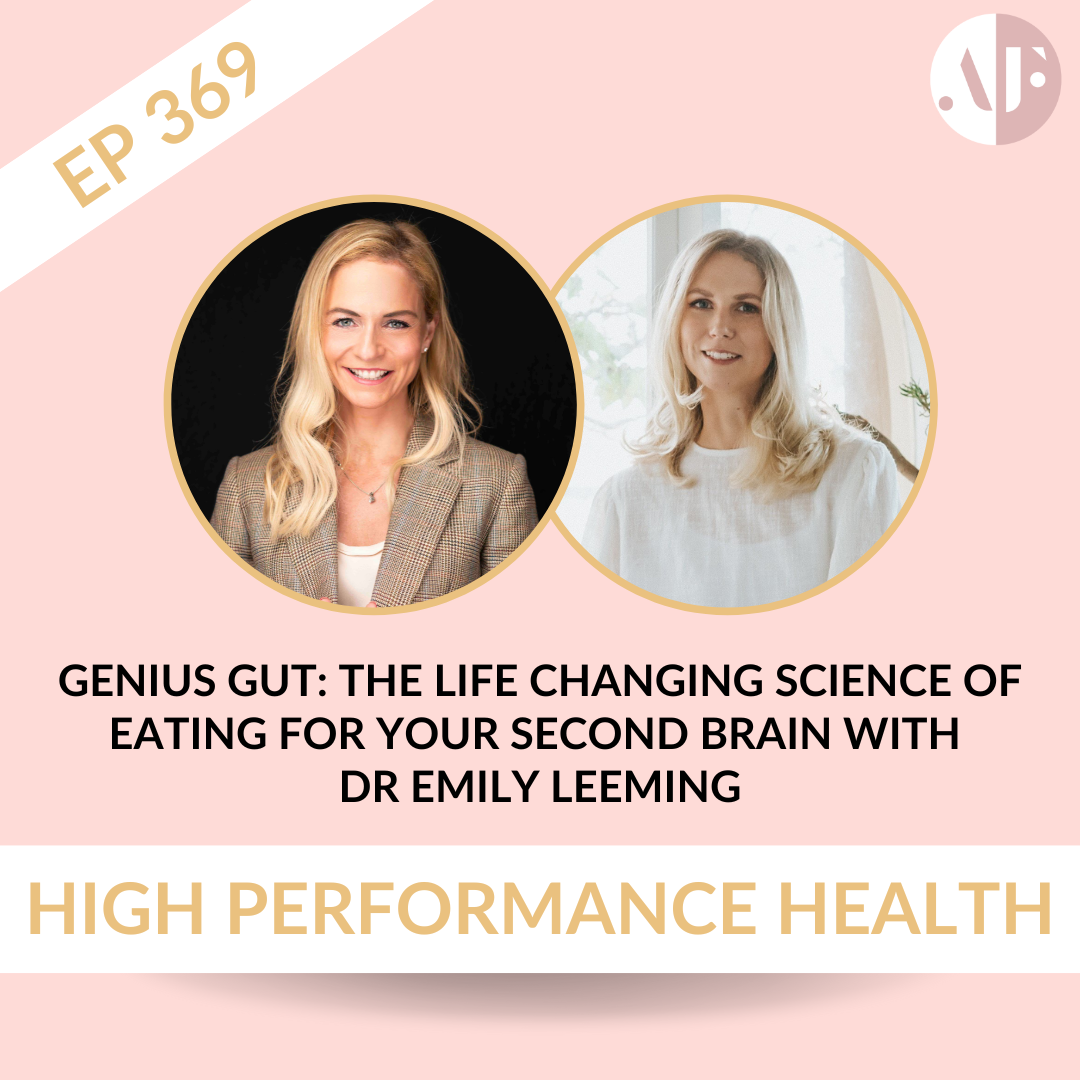
EP 369 – Genius Gut: The Life Changing Science of Eating For Your Second Brain with Dr Emily Leeming
Angela talks to Maddy Dychtwald, who shares insights from her book “Ageless Aging” focusing on women’s health, lowering biological age and longevity. They discuss the importance of hormone replacement therapy for brain health, the impact of an anti-inflammatory diet on metabolic health, and the significance of exercise for maintaining muscle mass and balance.

EP 368 – BITESIZE: Why You MUST Address Adrenal Function FIRST If You Want Your Sex Hormones And Thyroid To Function Properly – with Christa Biegler
Angela talks to Maddy Dychtwald, who shares insights from her book “Ageless Aging” focusing on women’s health, lowering biological age and longevity. They discuss the importance of hormone replacement therapy for brain health, the impact of an anti-inflammatory diet on metabolic health, and the significance of exercise for maintaining muscle mass and balance.
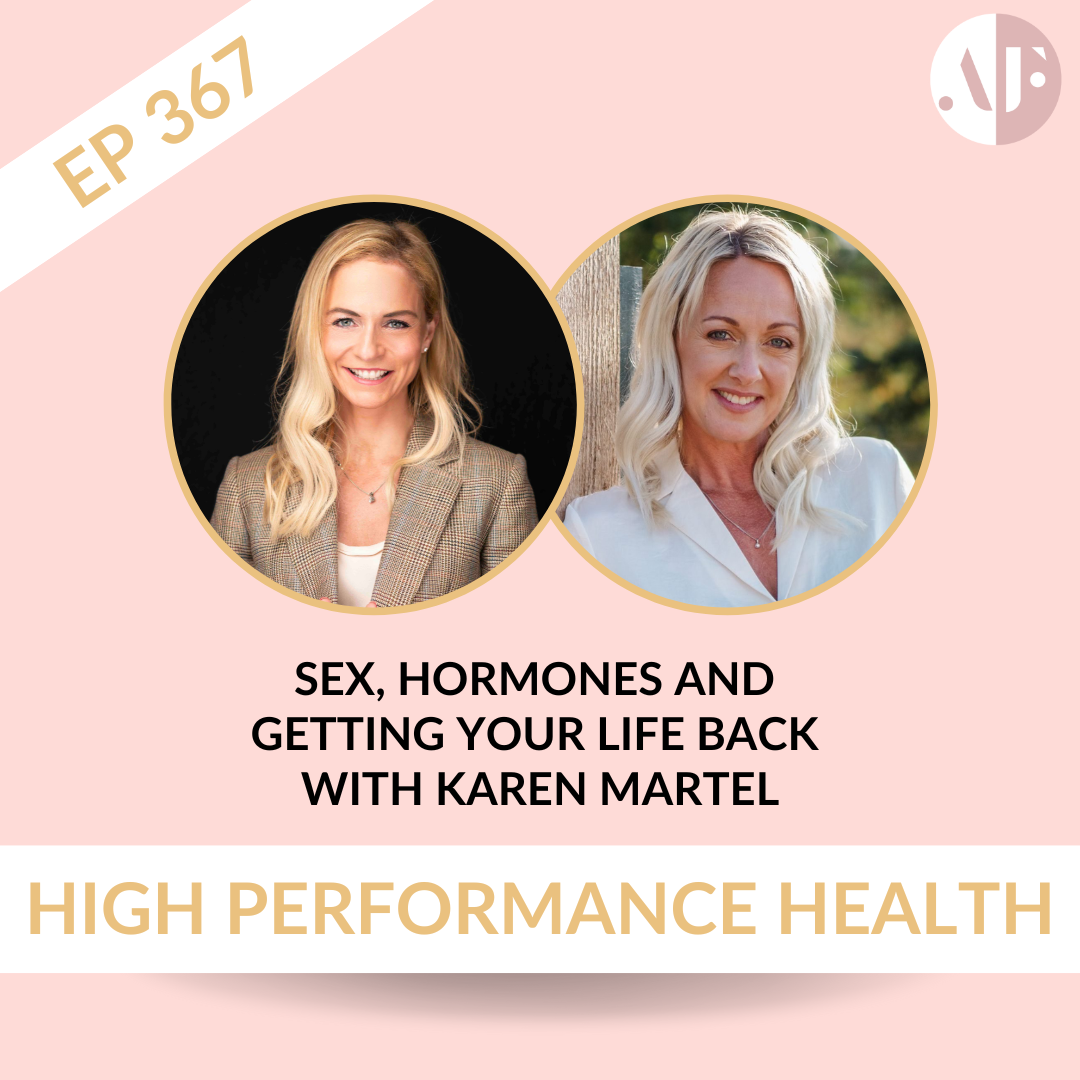
EP 367 – Sex, Hormones and Getting Your Life Back with Karen Martel
Angela talks to Maddy Dychtwald, who shares insights from her book “Ageless Aging” focusing on women’s health, lowering biological age and longevity. They discuss the importance of hormone replacement therapy for brain health, the impact of an anti-inflammatory diet on metabolic health, and the significance of exercise for maintaining muscle mass and balance.
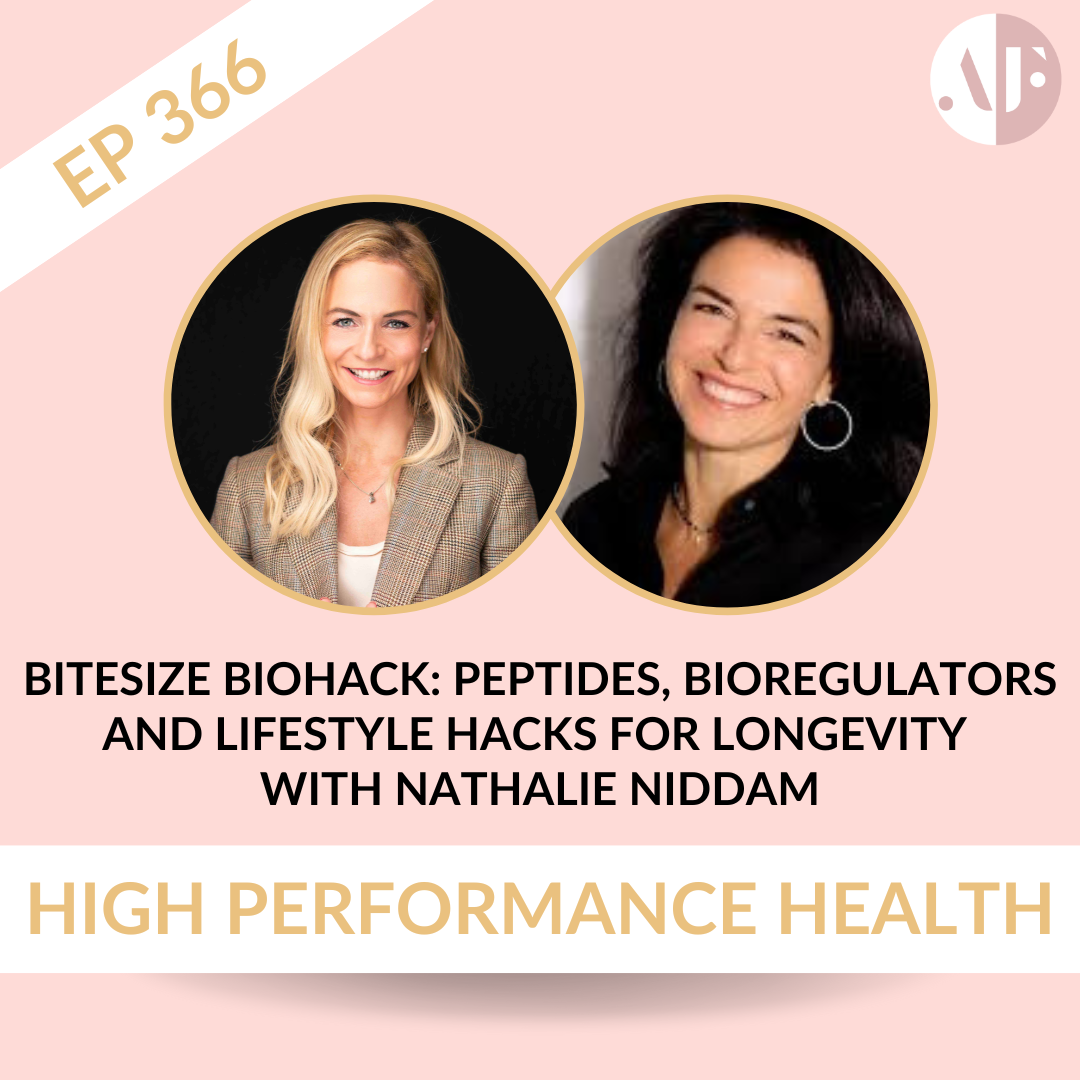
EP 366 – Bitesize Biohack: Peptides, Bioregulators and Lifestyle Hacks for Longevity with Nathalie Niddam
Angela talks to Maddy Dychtwald, who shares insights from her book “Ageless Aging” focusing on women’s health, lowering biological age and longevity. They discuss the importance of hormone replacement therapy for brain health, the impact of an anti-inflammatory diet on metabolic health, and the significance of exercise for maintaining muscle mass and balance.




